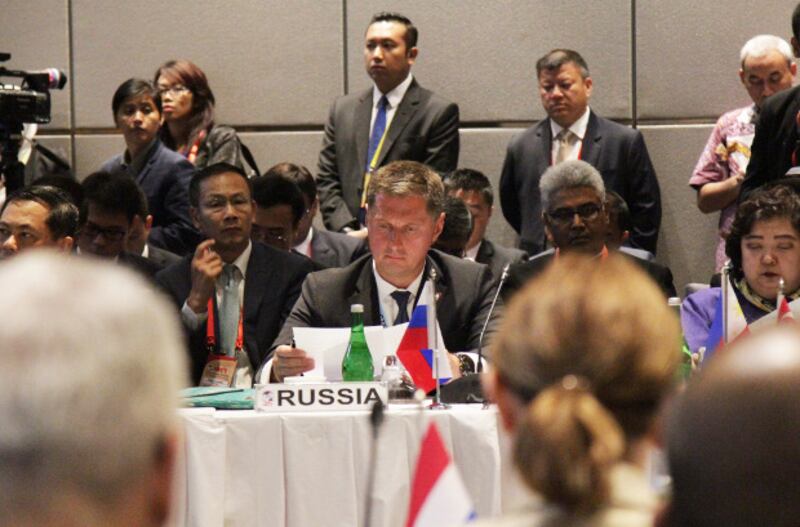Countries that want to combat terrorism must look at the root causes of this global phenomenon, Indonesia’s Vice President Jusuf Kalla told an international counter-terrorism conference in Bali on Wednesday.
Anger toward government policy, misconceptions of religion and ideology, and a lack of hope in facing the future are at the core of these causes, Kalla said in a keynote address at the International Meeting on Counter Terrorism (IMCT) in Nusa Dua.
“We feel angry seeing victims of terrorism but we also need to look at the roots of the problem in order to resolve it,” he said.
The vice president opened the one-day conference of 23 countries and three intergovernmental bodies, which Indonesia co-hosted with Australia and that ran in parallel with an international counter-terrorism financing conference at the same venue.
On Wednesday, Australian officials at the Bali meetings announced that Australia and Indonesia – in conjunction with Singapore, Malaysia, Thailand and the Philippines – had launched a first-of-its-kind, regional assessment of terror financing.
“This is probably the first time that any region across the globe has got together to assess what are the terror financing risk we are in it,” Australian Minister of Justice Michael Keenan said, according to an official transcript.
“From Australia’s perspective we believe it will be a very useful document to highlight the area of concerns that we can do better with in Australia, but also where we can share our expertise skill with others in the region to ensure that terrorists can’t move money around the Southeast Asian region,” he added.
Kalla Evokes U.S. Invasion of Iraq
In his speech before some 200 participants and attendees, Kalla said the so-called Islamic State (IS) had emerged in Iraq and Syria as a result of political instability in those two countries fomented by a superpower’s invasion.
“Therefore, big countries shouldn’t invade other countries for no clear reason,” he said.
Kalla added that terrorism cannot be solved with weapons and violence alone, since it arises from distorted ideology and misunderstanding of religion.
“The perpetrators of terrorism including what happened recently in Belgium and Paris are people who do not understand religion correctly,” he said.
Part of addressing the problem of terrorism, therefore, is changing the thinking of terrorists, he said.
“Based on my experience resolving the conflict in Poso, they join terror groups because they are tempted to reach heaven quickly. After I told them they would go to hell, they became aware,” he said.
In December 2001, Kalla helped bring about the 10-point Malino Declaration, a peace pact that helped bring an end to Muslim-Christian violence raging in Poso, a regency of Central Sulawesi province, since 1998.
Another issue that has to be anticipated by countries combatting terrorism, Kalla said, is the phenomenon of militants returning to their home countries after becoming Foreign Terrorist Fighters (FTF).

Russia was among the 23 countries attending the IMCT conference in Nusa Dua, Bali, Aug. 10, 2016. (Anton Muhajir/BeritaBenar)
‘Lone wolf’
The theme of IMCT was countering cross-border movement on terrorism.
“The participation of ASEAN (Association of Southeast Asian Nations), the U.N., and Interpol underlines that efforts by specific countries must be accompanied by robust bilateral, regional and even global cooperation,” Indonesia’s newly appointed Coordinating Minister for Political, Legal and Security Affairs, Wiranto, said in opening the meeting.
Attacks all over the world point to the need for all countries to be involved in the effort to prevent terrorism, he added.
“We choose to strengthen cooperation in a sustainable manner,” he said.
In addition to political instability and radical ideologies, another reason for the emergence of terrorism, according to Wiranto, is the use of cyber media, the flow of illegal terrorism financing and the return of foreign terrorist fighters to their home countries.
Combined, these forces have given rise to the “lone wolf” phenomenon, he said, in which individuals are radicalized and carry out attacks without belonging to any terrorist network or organization.
The ease of movement of people, goods and money across national borders has also fed the emergence of foreign terrorist fighters and lone wolf terrorists, he noted.
Paul Jevtovic, the chief of the Australian Transaction Reports and Analysis Center (AUSTRAC), told reporters in Bali that the lone-wolf phenomenon was one of the key areas that the countries participating in the regional risk assessment would collaborate on.
Self-funded lone-wolves “is one of the key findings that is consistent across the region,” Reuters quoted Jevtovic as saying.
ASEAN
Southeast Asian nations are aware of the Foreign Terrorist Fighter phenomenon, ASEAN General Secretary Le Luong Minh told the gathering.
ASEAN has already forged pacts that are key to handling the matter, such as the Declaration on Transnational Crime adopted in Manila in 1997, in which signatory countries agreed to increase their cooperation in fighting cross-border crime including terrorism.
Those commitments were renewed last year with the adoption of the Kuala Lumpur Declaration in Combating Transnational Crime, he said.
ASEAN also agreed to the Convention in Counter-Terrorism.
At a meeting in Kuala Lumpur in October 2015, ASEAN ministers agreed to place greater emphasis on de-radicalization and rehabilitation of militant individuals, as part of their overall approach to combatting terrorism.
“This approach was to help those already radicalized or extreme to return to society and to prevent a relapse or return to a militant or terrorist group,” he said.
The United Nations has also committed to preventing the proliferation of lone wolves.
“Foreign terrorist fighters are increasing the intensity and time period of conflicts issuing significant threats to the countries they stop in and later in their home countries upon return,” said Weixiong Chen, deputy executive director of the Counter Terrorism Committee Executive Directorate at the United Nations.
